- Home
- John Irving
A Widow for One Year Page 9
A Widow for One Year Read online
Page 9
When the boys died, it had been Ted’s suggestion to leave New England and all that New England reminded them of. The east end of Long Island was chiefly a summer haven and a weekend retreat for New Yorkers. For Marion it would be easier not to talk with her old friends.
“A new place, a new child, a new life,” she said to Eddie. “At least that was the idea.”
That Ted’s love affairs had not abated since leaving those New England college and university towns was not surprising to Marion. In truth, his infidelities had increased in number—if not in any observable measure of passion. Ted was addicted to love affairs. Marion had a bet with herself to see if Ted’s addiction to seductions would prove stronger or weaker than his addiction to alcohol. (Marion was betting that Ted could more easily give up the alcohol.)
And with Ted, Marion explained to Eddie, the seduction always lasted longer than the affair. First there were the conventional portraits, usually the mother with her child. Then the mother would pose alone, then nude. The nudes themselves revealed a predetermined progression: innocence, modesty, degradation, shame.
“Mrs. Vaughn!” Eddie interrupted, recalling the little woman’s furtiveness.
“Mrs. Vaughn is presently experiencing the degraded phase,” Marion told him.
For such a small woman, Mrs. Vaughn left a big smell on the pillows, Eddie thought; he also thought it would be imprudent, even prurient, for him to voice his opinion of Mrs. Vaughn’s odor to Marion.
“But you’ve stayed with him all these years,” the sixteen-year-old said miserably. “Why didn’t you leave him?”
“The boys loved him,” Marion explained. “And I loved the boys. I was planning to leave Ted after the boys finished school—after they had left home. Maybe after they’d finished college,” she added with less certainty.
Overcoming his unhappiness on her behalf, Eddie ate a mountainous dessert.
“That’s what I love about boys,” Marion told him. “No matter what, you just go on about your business.”
She let Eddie drive home. She rolled her window down and closed her eyes. The night air blew through her hair. “It’s nice to be driven,” she told Eddie. “Ted always drank too much. I was always the driver. Well . . . almost always,” she said in a whisper. Then she turned her back to Eddie; she might have been crying, because her shoulders were shaking, but she didn’t make a sound. When they arrived at the house in Sagaponack, either the wind had dried her tears or she hadn’t been crying at all. Eddie only knew, from the time he had cried in front of her, that Marion didn’t approve of crying.
In the house, after she dismissed the nighttime nanny, Marion poured herself a fourth glass of wine from an open bottle in the refrigerator. She made Eddie come with her when she checked to see if Ruth was asleep, whispering that, despite every appearance to the contrary, she had once been a good mother. “But I won’t be a bad mother to Ruth,” she added, still in a whisper. “I would rather be no mother to her than a bad one.” At the time, Eddie didn’t understand that Marion already knew she was going to leave her daughter with Ted. (At the time, Marion didn’t understand that Ted had hired Eddie not only because he needed a driver.)
The feeble night-light from the master bathroom cast such faint illumination into Ruth’s room that the few photographs of Thomas and Timothy were difficult to see; yet Marion insisted that Eddie look at them. She wanted to tell Eddie what the boys were doing in each of the pictures, and why she’d selected these particular photos for Ruth’s room. Then Marion led Eddie into the master bathroom, where the night-light illuminated those photographs only a little more clearly. Here Eddie could discern a water theme, which Marion had found appropriate for the bathroom: a holiday in Tortola, and one in Anguilla; a summer picnic at the pond in New Hampshire; and Thomas and Timothy, when they were both younger than Ruth, in a bathtub together—Tim was crying, but Tom was not. “He got soap in his eyes,” Marion whispered.
The tour continued into the master bedroom, where Eddie had never been before—nor had he seen the photographs, each one of which summoned a story from Marion. And so on, throughout the house. They traveled from room to room, from picture to picture, until Eddie realized why Ruth had been so agitated by the little scraps of notepaper covering Thomas’s and Timothy’s bare feet. Ruth would have taken this tour of the past on many, many occasions—probably in both her father’s and her mother’s arms—and to the four-year-old, the stories of the photographs were doubtless as important as the photographs themselves. Maybe more important. Ruth was growing up not only with the overwhelming presence of her dead brothers, but also with the unparalleled importance of their absence.
The pictures were the stories, and vice versa. To alter the photographs, as Eddie had, was as unthinkable as changing the past. The past, which was where Ruth’s dead brothers lived, was not open to revision. Eddie vowed that he would try to make it up to the child, to reassure her that everything she’d ever been told about her dead brothers was immutable. In an unsure world, with an uncertain future, at least the child could rely on that. Or could she?
More than an hour later, Marion ended the tour in Eddie’s bedroom —and, finally, in the guest bathroom that Eddie used. There was an appropriate fatalism to the fact that the last photograph to inspire Marion’s background narration was the picture of Marion herself, in bed with the two bare feet.
“I love that picture of you, ” Eddie managed to say, not daring to add that he had masturbated to the image of Marion’s bare shoulders— and to her smile. As if for the first time, Marion slowly considered herself in the twelve-year-old photograph.
“I was twenty-seven,” she said, the passage of time, the melancholy of it, filling her eyes.
It was her fifth glass of wine, which she finished now in a perfunctory fashion. Then she handed her empty glass to Eddie. He remained standing where he was, in the guest bathroom, for a full fifteen minutes after Marion had left him.
The next morning, in the carriage-house apartment, Eddie had only begun his arrangement of the pink cashmere cardigan on the bed— together with a lilac-colored silk camisole and matching panties—when he heard Marion’s exaggerated clomping on the stairs leading up from the garage. She didn’t knock on the door—she beat on the door. She wasn’t going to catch Eddie in the act this time. He had not yet undressed to lie down beside her clothes. Nevertheless, a moment of indecision overcame him, and then there wasn’t time to put Marion’s clothes away. He’d been thinking about what an unwise color choice it had been for him to put pink and lilac together; yet the colors of her clothes were never what motivated him. He had been drawn to the lace on the waist of the panties, and to the lace in the fabulous décolletage of the camisole. Eddie was still fretting over his decision when Marion beat on the door a second time; he left her clothes on the bed and hurried to answer the door.
“I hope I’m not disturbing you,” she said with a smile. She was wearing sunglasses, which she removed when she came into the apartment. For the first time, Eddie noticed her age in the crow’s-feet at the outer corners of her eyes. The night before maybe Marion had had too much wine—five glasses of anything alcoholic was a lot for her.
To Eddie’s surprise, she moved directly to the first of the few photographs of Thomas and Timothy she’d brought to the rental house, proceeding to explain her choices to Eddie. The pictures were of Thomas and Timothy when they were more or less Eddie’s age, which meant the photos had been taken shortly before the boys died. Marion explained that she’d thought Eddie might find photographs of his contemporaries familiar, even welcoming, in what might be un familiar and un welcome circumstances. She’d worried about Eddie, long before he arrived, because she knew how little there would be for him to do . And she had doubted that he would have an easy time of it; she’d anticipated the nonexistence of any social life for the sixteen-year-old.
“Excepting the younger of Ruth’s nannies, who were you ever going to meet?” Marion asked. “Unless you were especially
outgoing. Thomas was outgoing, Timothy was not—he was more introspective, like you. Although you look more like Thomas,” Marion told Eddie, “I think you are more like Timothy.”
“Oh,” Eddie said. He was stunned that she’d been thinking about him before he arrived!
The photography tour continued. It was as if the rental house were a secret room off the guest-wing hall, and Eddie and Marion had not ended their evening together; they had merely moved on, to another room, with other pictures. They traipsed through the kitchen of the carriage-house apartment—Marion talking and talking all the while— and back into the bedroom, where she continued talking, pointing to the one photograph of Thomas and Timothy that hung over the headboard of the bed.
Eddie had little difficulty recognizing a most familiar landmark of the Exeter campus. The dead boys were posed in the doorway of the Main Academy Building, where, under the pointed pediment above the door was a Latin inscription. Chiseled into the white marble, which was offset by the great brick building and the forest-green double door itself, were these humbling words:
HVC VENITE PVERI
VT VIRI SITIS
(The U’s in HUC and PUERI and UT had all been carved like V’s, of course.) There were Thomas and Timothy in their jackets and ties, the year of their deaths. At seventeen, Thomas seemed almost a man—at fifteen, Timothy seemed very much a boy. And the doorway where they stood was the photo background most commonly chosen by the proud parents of countless Exonians. Eddie wondered how many unformed bodies and minds had passed through that door, under that stern and forbidding invitation.
COME HITHER BOYS
AND BECOME MEN
But it hadn’t happened for Thomas and Timothy. Eddie was aware that Marion had paused in her narration of the photograph; her eyes had fallen upon her own pink cashmere cardigan, which (together with her lilac-colored camisole and matching panties) was displayed on the bed.
“Goodness—not pink with lilac!” Marion said.
“I wasn’t thinking of the colors,” Eddie admitted. “I liked the . . . lace.” But his eyes betrayed him; he was looking at the décolletage of the camisole, and he couldn’t remember the word for it. Cleavage came to his mind, although he knew that wasn’t the right word.
“The décolletage?” Marion prompted.
“Yes,” Eddie whispered.
Marion raised her eyes above the bed to the image of her happy sons: Huc venite pueri (come hither boys) ut viri sitis (and become men). Eddie had suffered through his second year of Latin; a third year of the dead language loomed ahead of him. He thought of the long-standing joke at Exeter about a more fitting translation of that inscription. (“Come hither boys and become weary .”) But he could sense that Marion was in no mood for a joke.
Looking at the photograph of her boys on the threshold of manhood, Marion said to Eddie: “I don’t even know if they had sex before they died.” Eddie, remembering that picture of Thomas kissing a girl in the ’53 yearbook, would have guessed that Thomas had. “Maybe Thomas had,” Marion added. “He was so . . . popular. But surely not Timothy—he was so shy. And he was only fifteen. . . .” Her voice trailed away and her glance fell back to the bed, where the pink and lilac combination of her sweater with her lingerie had earlier caught her eye. “Have you had sex, Eddie?” Marion asked abruptly.
“No, of course not,” Eddie told her. She smiled at him—pityingly. He tried not to look as wretched and unlovable as he was convinced he was.
“If a girl died before she had sex, I might say she was lucky,” Marion continued. “But for a boy . . . my goodness, it’s all boys want, isn’t it? Boys and men,” she added. “Isn’t it true? Isn’t it all you want?”
“Yes,” said the sixteen-year-old despairingly.
Marion stood by the bed and picked up the lilac-colored camisole with the incredible décolletage; she picked up the matching panties, too, but she pushed the pink cashmere cardigan to the far side of the bed. “It’s too hot,” she said to Eddie. “I hope you’ll forgive me if I don’t wear the sweater.”
He stood there frozen, his heart pounding, while she began to unbutton her blouse. “Close your eyes, Eddie,” she had to tell him. With his eyes closed, he was afraid he might faint. He felt himself weaving from side to side; it was all he could do not to move his feet. “Okay,” he heard her say. She was lying on the bed in the camisole and the panties. “My turn to close my eyes,” Marion said.
Eddie undressed clumsily—he had to keep looking at her. When she felt his weight on the bed beside her, she turned on her side to face him. When they looked into each other’s eyes, it gave Eddie a pang. In Marion’s smile, there was more that was motherly than what he had dared to hope he might see there.
He didn’t touch her, but when he began to touch himself, she gripped the back of his neck and pulled his face against her breasts, where he hadn’t even dared to look. With her other hand, she took his right hand and firmly placed it where she had seen him put his hand the first time—against the crotch of her panties. He felt himself explode into the palm of his left hand, so quickly and with such force that he flinched against her. Marion was so surprised that she flinched in response. “Goodness— that was fast!” she said. Holding his cupped palm in front of him, Eddie ran into the bathroom before he made a mess.
When he’d washed himself, he came back to the bedroom, where he found Marion still lying on her side, almost exactly as he had left her. He hesitated before lying down beside her. But without moving on the bed or looking at him, she said, “Come back here.”
They lay looking into each other’s eyes for what seemed to Eddie to be a never-ending time—at least he never wanted the moment to end. All his life, he would hold this moment as exemplary of what love was. It was not wanting anything more, nor was it expecting people to exceed what they had just accomplished; it was simply feeling so complete . No one could possibly deserve to feel any better.
“Do you know Latin?” Marion whispered to him.
“Yes,” he whispered back.
She rolled her eyes upward, above the bed, to indicate the photograph of that important passage, which her sons had not navigated. “Say it in Latin for me,” Marion whispered.
“Huc venite pueri . . .” Eddie began, still whispering.
“Come hither boys . . .” Marion translated in a whisper.
“ . . . ut viri sitis,” Eddie concluded; he’d noticed that Marion had taken his hand and again placed it against the crotch of her panties.
“. . . and become men,” Marion whispered. Again she gripped the back of his neck and pulled his face against her breasts. “But you still haven’t had sex, have you?” she asked. “I mean not really .”
Eddie closed his eyes against her fragrant bosom. “No, not really,” he admitted. He was worried, because he didn’t want to sound as if he were complaining. “But I’m very, very happy,” he added. “I feel complete .”
“I’ll show you complete, ” Marion told him.
The Pawn
Regarding sexual capacity, a sixteen-year-old boy is capable of an astonishing number of repeat performances in what Marion, at thirty-nine, would attest was a remarkably short period of time. “My goodness !” Marion would exclaim, to the perpetual and nearly constant evidence of Eddie’s erections. “Don’t you need time to . . . recover ?” But Eddie required no recovery; paradoxically, he was both easily satisfied and insatiable.
Marion was happier than she’d been at any time she could remember since her sons had died. For one thing, she was exhausted; she was sleeping more soundly than she had in years. And for another thing, Marion took no pains to conceal her new life from Ted. “He wouldn’t dare complain to me, ” she told Eddie, who was nonetheless anxious that Ted might dare complain to him.
Poor Eddie was understandably nervous about the obviousness of their thrilling affair. For example, whenever their lovemaking had marked the sheets in the carriage-house apartment, it was Eddie who was in favor of doing the laundry—
lest Ted should see the telltale stains. But Marion always said, “Let him wonder if it’s me or Mrs. Vaughn.” (When there were stains on the bedsheets in the master bedroom of the Coles’ house, where Mrs. Vaughn could not have been the cause, Marion said, more to the point, “Let him wonder.”)
As for Mrs. Vaughn, whether or not she knew of the strenuousness of Marion’s exertions with Eddie, her more subdued relationship with Ted had changed. While Mrs. Vaughn had once epitomized furtiveness by her hesitant and darting movements in the driveway—both on her way to model and on her way back to her car—she now approached every new opportunity to pose with the resignation of a dog submitting to a beating. And when Mrs. Vaughn left Ted’s workroom, she staggered to her car with a carelessness that implied her pride was irretrievable; it was as if the particular pose of the day had defeated her. Mrs. Vaughn had clearly passed from the degraded phase, as Marion had called it, into the final phase of shame.
Ted had never been in the habit of visiting Mrs. Vaughn at her summer estate in Southampton more than three times a week. But the visits were less frequent now, and of notably shorter duration. Eddie knew this because he was always Ted’s driver. Mr . Vaughn spent the workweek in New York. Ted was happiest in the Hamptons during the summer months, when so many young mothers were there without their commuting husbands. Ted preferred the young mothers from Manhattan to the year-round residents; the summer people were on Long Island just long enough—“the perfect length of time for one of Ted’s affairs,” Marion had informed Eddie.
It made Eddie anxious. He had to wonder what Marion thought was “the perfect length of time” for her affair with him . He didn’t dare ask.

 My Movie Business: A Memoir
My Movie Business: A Memoir In One Person
In One Person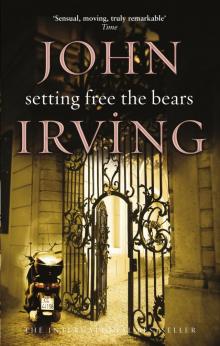 Setting Free the Bears
Setting Free the Bears The Fourth Hand
The Fourth Hand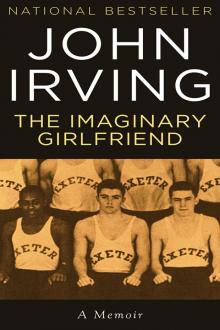 The Imaginary Girlfriend
The Imaginary Girlfriend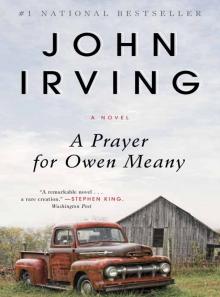 A Prayer for Owen Meany
A Prayer for Owen Meany A Son of the Circus
A Son of the Circus Last Night in Twisted River
Last Night in Twisted River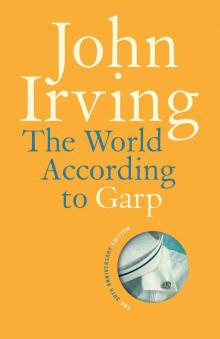 The World According to Garp
The World According to Garp The Cider House Rules
The Cider House Rules The Hotel New Hampshire
The Hotel New Hampshire The 158-Pound Marriage
The 158-Pound Marriage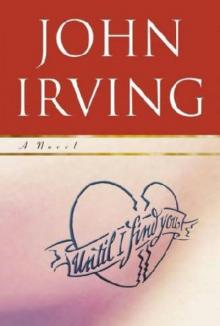 Until I Find You
Until I Find You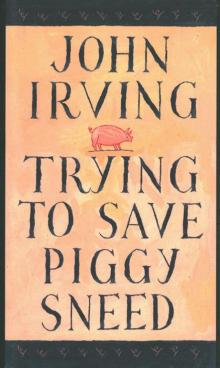 Trying to Save Piggy Sneed
Trying to Save Piggy Sneed Cider House Rules
Cider House Rules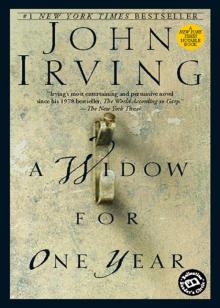 A Widow for One Year
A Widow for One Year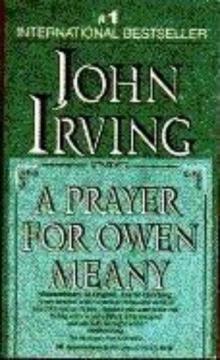 A prayer for Owen Meany: a novel
A prayer for Owen Meany: a novel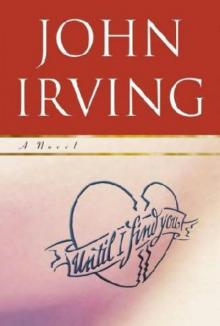 (2005) Until I Find You
(2005) Until I Find You